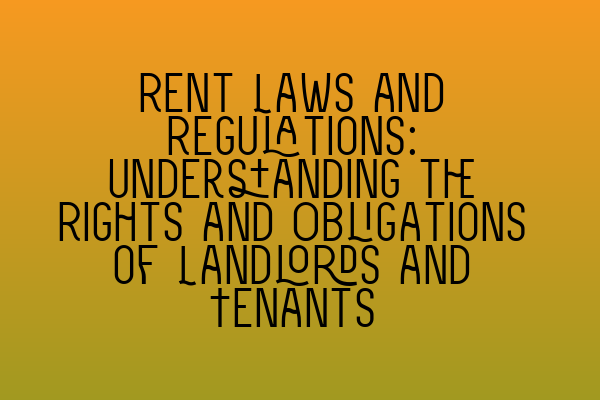Rent Laws and Regulations: Understanding the Rights and Obligations of Landlords and Tenants
Renting a property is a common practice in today’s society. Whether you are a tenant looking for a place to live or a landlord seeking to generate income from your property, it is important to understand the rent laws and regulations that govern the landlord-tenant relationship. These laws are designed to protect the rights and obligations of both parties involved.
In this comprehensive guide, we will explore the key aspects of rent laws and regulations, providing you with a deep understanding of your rights and responsibilities as either a landlord or a tenant. We will cover topics such as rental agreements, rent increases, security deposits, maintenance obligations, eviction processes, and more.
To begin, let’s discuss rental agreements. A rental agreement is a legal contract between a landlord and a tenant that outlines the terms and conditions of the rental arrangement. It typically includes important details such as the rental period, the amount of rent to be paid, the responsibilities of the landlord and tenant, and any additional terms or clauses specific to the property.
It is crucial for both landlords and tenants to carefully review and understand the rental agreement before signing it. This document serves as a binding agreement between the parties, and failure to comply with its terms can result in legal consequences. To ensure that you are fully informed, it may be helpful to consult with a property law solicitor who can provide expert advice and guidance based on your specific situation.
One key aspect of the rental agreement is the provision regarding rent increases. In many jurisdictions, landlords must adhere to specific regulations when increasing the rent. These regulations vary from place to place, and it is important to familiarize yourself with the laws applicable to your area. Tenants should be aware of their rights and the procedures for challenging unjustified rent increases.
Security deposits are another important consideration when renting a property. A security deposit is a sum of money paid by the tenant to the landlord as a form of protection against any potential damages or non-payment of rent. The exact amount and rules regarding security deposits may vary depending on local regulations. Landlords must follow strict guidelines for handling and returning security deposits, and tenants have the right to dispute any unjust deductions.
Maintenance obligations are also a critical aspect of the landlord-tenant relationship. Landlords are generally responsible for maintaining the property in a habitable condition, ensuring that all essential services are in working order. Tenants have the obligation to report any maintenance issues in a timely manner and allow reasonable access to the landlord or their agents for necessary repairs. Understanding these obligations is crucial to maintaining a healthy living environment.
Evictions can be a contentious issue in the landlord-tenant relationship. While the reasons for eviction may vary depending on the jurisdiction, it is essential for landlords to follow the proper legal procedures. Tenants have the right to due process, and it is important for landlords to ensure that they have a valid reason for eviction and follow all required steps.
In conclusion, understanding the rights and obligations of landlords and tenants is essential when it comes to renting a property. By familiarizing yourself with the rent laws and regulations applicable to your area, you can protect your rights and interests as either a landlord or a tenant. If you require further guidance or advice, it is recommended to consult with a property law solicitor who specializes in these matters.
Stay informed and make use of the resources available to you. Consider joining our SQE Contract Law webinars for expert insights and guidance. You can also test your knowledge with our interactive SQE mock tests for Contract Law. Additionally, you may find it helpful to explore related articles on contract law reforms, parties’ rights and responsibilities in a contract, and the importance of ethics in contract law.
Remember, being well-informed is the key to ensuring a smooth and mutually beneficial landlord-tenant relationship.
